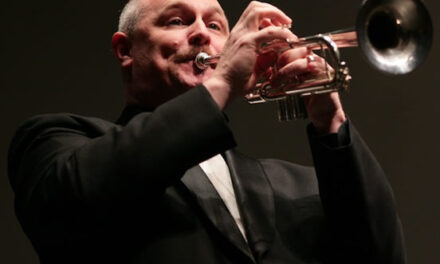Readers of this review may find it somewhat different from the tone and content of my past reviews. After listening to the waltzes, polkas and vocal pieces included in “An Afternoon in Vienna,” performed by the Asheville Chamber Players at St. Matthias Church, I decided to change my usual focus from that of the hard-nosed critic who insists that everything she hears must be musically perfect and evaluate the program according to the enjoyment expressed by its audience.
The Asheville Chamber Players, conducted by Stephen Klein, presented several of the great favorites of Viennese music composed by Johann Strauss, both father and son; Edward Strauss; and Franz Lehar. The performance of this group elicited prolonged applause and enthusiastic conversation by an audience which filled the church sanctuary.
There was nothing new about any of the music. But it sparkled with the well-beloved waltz melodies characterized by the composers’ brilliant orchestration and encouraged some discreet humming of the music by many Strauss-lovers in the audience (including myself, I must admit). I did notice some performance problems, especially in intonation, ragged entrances, jerky, disjointed movements from one thematic section to another and occasional very wrong notes. I also noticed that I was the only one who was paying attention to what seemed to me some sub-par playing. Everyone else could not have cared less, and my recognition of this fact made me feel like the Grinch who stole Viennese music. Indeed, most of the audience members were tapping their toes quietly while they enjoyed the music and watched admiringly the several pairs of exhibition dancers who moved effortlessly up and down the aisles to the infectious rhythms in three-quarter time.
Although the large audience was carried away by all the pieces the orchestra had to offer, many people had their favorite numbers, chiefly “Tales from the Vienna Woods,” “The Blue Danube Waltzes,” the romantic “One Heart One Mind Mazurka,” “The Tritsch-Tratsch Polka,” “The Pizzicato Polka,” and the concluding “Radetsky March,” during which the audience’s rhythmic clapping evoked in my memory the same kind of enthusiastic response to the same piece in many Boston Pops concerts.
This concert of Viennese music was not without two vocal works which have always captivated audiences and listeners alike. Soprano Sarah Swann sang “The Laughing Song” from Strauss’s operetta Die Fledermaus, and the beautiful, deeply romantic “Vilia” from Franz Lehar’s The Merry Widow. Her performances delighted her audience. In the Strauss piece her comedic enunciation of the text, occasional coloratura passages and brilliant high notes drew enthusiastic applause. The Lehar piece, with its dream-like romantic text and the lyric setting which so fully conveys its meaning, showed all present her musical versatility and her obvious pleasure in performing. There was only one problem for her: in many forte lines, especially in “Vilia,” she could not be heard over the orchestra.
Despite the musical problems which occurred and which were very obvious to me, the music critic who supposedly hears all and sees all, I must admit that the large audience who loved Viennese music and were not at all disturbed by difficulties which the Asheville Chamber Players encountered were far better critics of this performance than yours truly.











